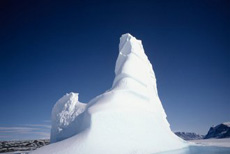Global climate change impacts
 When water warms up it expands. At the same time global warming causes polar ice sheets and glaciers to melt.
When water warms up it expands. At the same time global warming causes polar ice sheets and glaciers to melt.
The combination of these changes is causing sea levels to rise, resulting in flooding and erosion of coastal and low lying areas.
Extreme weather, shifting rainfall
Heavy rain and other extreme weather events are becoming more frequent. This can lead to floods and decreasing water quality, but also decreasing availability of water resources in some regions.
Consequences for Europe
- Southern and central Europe are seeing more frequent heat waves, forest fires and droughts.
- The Mediterranean area is becoming drier, making it even more vulnerable to drought and wildfires.
- Northern Europe is getting significantly wetter, and winter floods could become common.
- Urban areas, where 4 out of 5 Europeans now live, are exposed to heat waves, flooding or rising sea levels, but are often ill-equipped for adapting to climate change.
Consequences for developing countries
Many poor developing countries are among the most affected. People living there often depend heavily on their natural environment and they have the least resources to cope with the changing climate.
Risks for human health
Climate change is already having an impact on health:
- There has been an increase in the number of heat-related deaths in some regions and a decrease in cold-related deaths in others.
- We are already seeing changes in the distribution of some water-borne illnesses and disease vectors.
Costs for society and economy
Damage to property and infrastructure and to human health imposes heavy costs on society and the economy.
Between 1980 and 2011 floods affected more than 5.5 million people and caused direct economic losses of more than €90 billion.
Sectors that rely strongly on certain temperatures and precipitation levels such as agriculture, forestry, energy and tourism are particularly affected.
Risks for wildlife
Climate change is happening so fast that many plants and animal species are struggling to cope.
Many terrestrial, freshwater and marine species have already moved to new locations. Some plant and animal species will be at increased risk of extinction if global average temperatures continue to rise unchecked.

